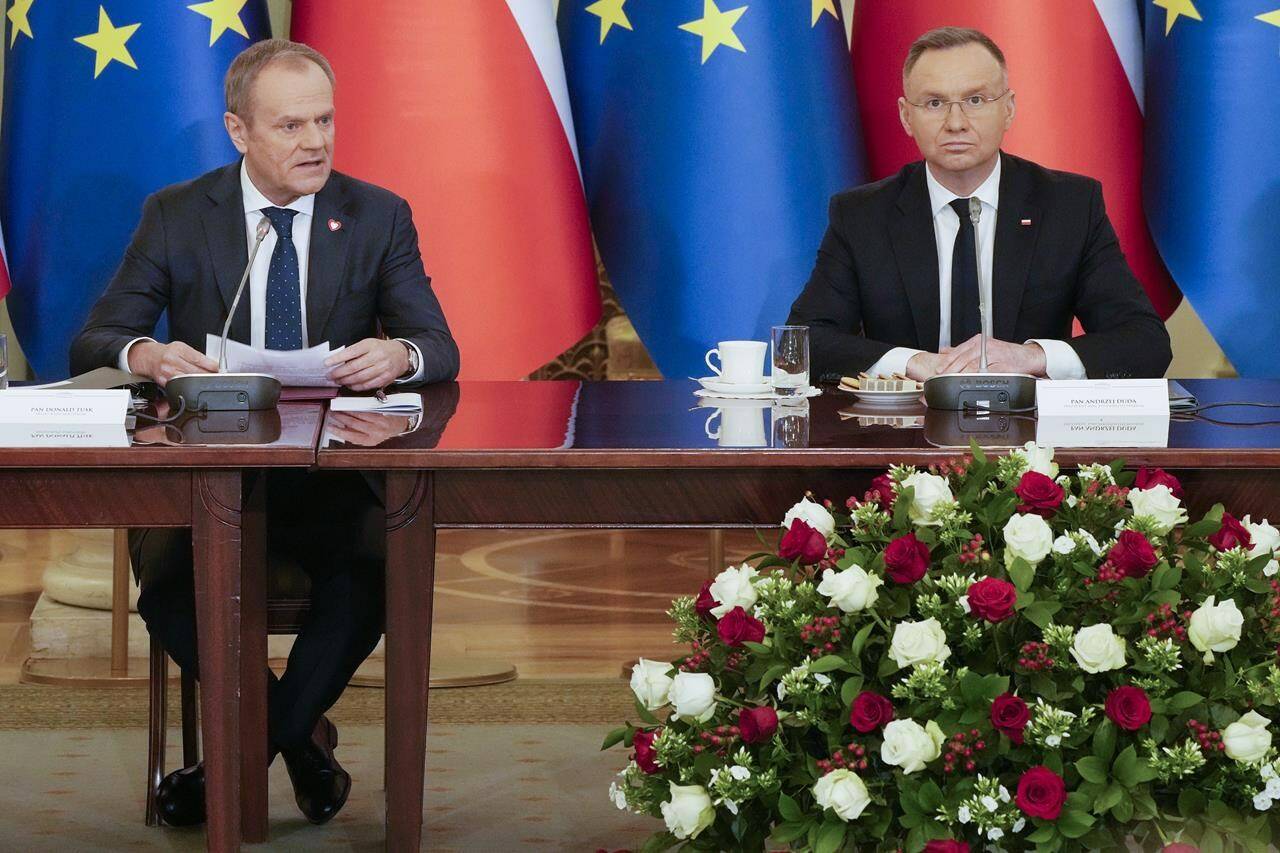Prime Minister Justin Trudeau defended Canada’s defence spending Monday as Polish counterpart Donald Tusk urged the rest of the West to confront the very real dangers now posed by Vladimir Putin’s Russia.
There is still more to do, but Canada is doing it, Trudeau said during a joint news conference alongside Tusk, who now finds himself back in his old post as Poland’s prime minister.
“I recognize Poland stepping up significantly in its own military spending. But so will Canada,” Trudeau said, the two leaders flanked by the Polish and Canadian flags.
“We will continue to make sure that the women and men of the Canadian Armed Forces — and the people around the world, our allies, who rely on them — will continue to get the equipment and the support they need.”
Tusk, for his part, steered his criticisms away from Canada directly as he urged the “whole western world, and especially Europe” to ensure Ukraine has the resources it needs for a decisive victory over Russia.
“Within the next couple of years, or even months, we have to reach defence capacities as regards ammunition production, and all kinds of weapons that will really exceed the Russian capacities,” he said through a translator.
“Otherwise, Europe will be subject to Russian aggression and will not be able to help Ukraine.”
Canada’s defence commitments to Poland and Ukraine to date have been “outstanding,” Tusk said, as he dismissed former U.S. president Donald Trump’s bellicose rhetoric around NATO spending.
But the easiest solution to such complaints, he suggested, is for all NATO members to step up and meet the mandated spending threshold of two per cent of GDP.
“I think that we would deprive of arguments … such politicians as the former U.S. president, who think that NATO will not defend allies if they don’t fulfil NATO requirements,” he said.
“The simplest answer is that we all, with no exception, fulfil those requirements.”
It will happen sooner or later, Tusk added — “and it’s better than they do it sooner than later.”
Canada is the seventh-largest contributor to defence of all 31 NATO allies, said Trudeau, noting that his Liberal government has already committed to a new fleet of high-tech stealth fighters and the modernization of the Canada-U.S. joint command known as Norad.
Both leaders acknowledged that there are those elsewhere in the world, including in Europe, whose willingness to support Ukraine threatens to falter and who stand in the way of a united front.
“It is a time where citizens cannot take their democracies for granted,” Trudeau said.
“We need to continue to be there, to lean in — not just on being worried about their daily challenges … but making sure we are building peace, stability and prosperity for future generations as well.”
Trudeau, who spent Saturday in Kyiv reaffirming Canada’s support for Ukraine, met earlier with Tusk and President Andrzej Duda at the Presidential Palace in Warsaw.
He capped off his trip Monday with a visit to the Polish capital, his first since a political sea change in the country late last year ended eight years of national conservative rule.
Tusk, who also served as prime minister from 2007-14, is a centrist who took office in December and has been working to strengthen ties with the rest of Europe. Duda, meanwhile, stands on the other side of the political divide — a conservative leader who now finds himself contending with a very different government.
The meetings focused on the dangers facing Ukraine and the importance of the NATO alliance, the primary bulwark between Russia and the rest of Europe.
Canada is under renewed pressure to spend two per cent of its gross domestic product on defence — a NATO-mandated target most other allies are expected to hit by the end of the year.
Canada’s spending hovers around 1.3 per cent of GDP.
Both Canada and Poland have rallied around Ukraine as the country enters its third year of war with dwindling supplies and personnel challenges, prompting an urgent plea for help from Ukrainian President Volodymyr Zelenskyy.
Its troops recently withdrew from the strategic eastern city of Avdiivka, handing Moscow one of its biggest victories. And Russia still controls roughly a quarter of the country after Ukraine failed to make any major breakthroughs with its summertime counteroffensive.
The looming uphill battle didn’t prevent Trudeau from beginning his visit with a renewed vow to back Ukraine until it sees victory.
“Putin cannot win,” Trudeau said Saturday in a speech from Hostomel airport, where Ukrainian soldiers beat back a Russian assault on the first day of the invasion.
“Ukraine will see victory, just like what happened on this ground two years ago.”
The Polish government wants to ensure Canada and other allies stay engaged in the war raging just over its border, Canada’s ambassador to the country said in an interview on the weekend.
Catherine Godin called the war in Ukraine a real and present threat to the people of Poland.
The two countries have been co-operating on military training missions to bolster the military skills of Ukraine’s armed forces. And Poland appreciates Canada’s role in guarding NATO’s eastern flank in Latvia, Godin said.
As for what the change of government in Poland means for Canada, Godin said Canada wants to support Tusk’s momentum.
Tusk has been working to repair Warsaw’s fraught relationship with Brussels after the European Union described Poland’s previous government as a threat to judicial independence.
In 2021, the EU called out what it considered deficiencies in Poland’s national justice systems, anticorruption frameworks and media freedom.
“They’ve been working really hard on the rule of law. It’s been the key preoccupation to allow them to demonstrate that they’re committed to it and that they can access EU funds and they are demonstrating commitment on human rights,” Godin said.
“This is aligned with Canadian values as well.”
READ ALSO: Canada invests $273M into air defence equipment for NATO mission in Latvia

